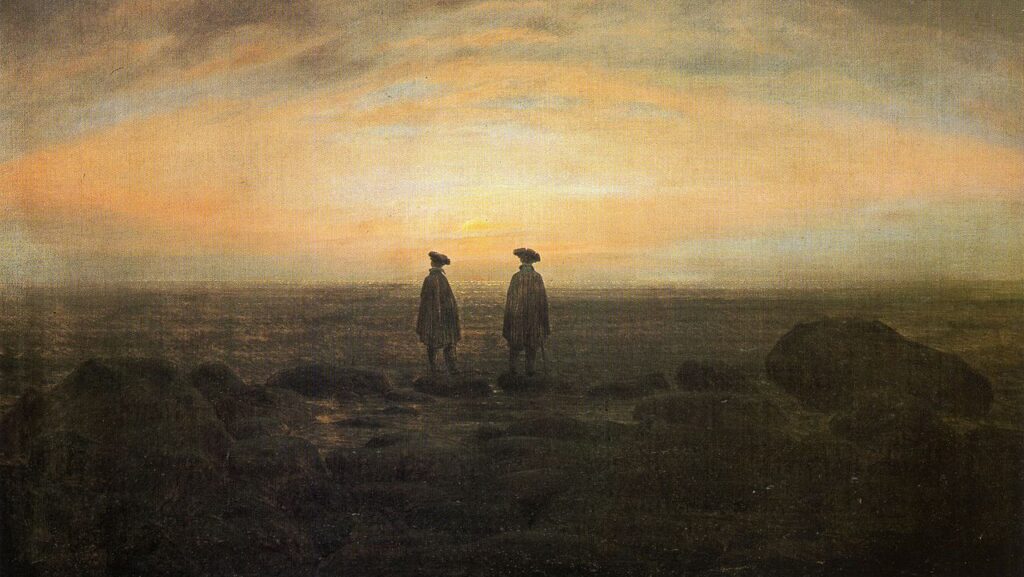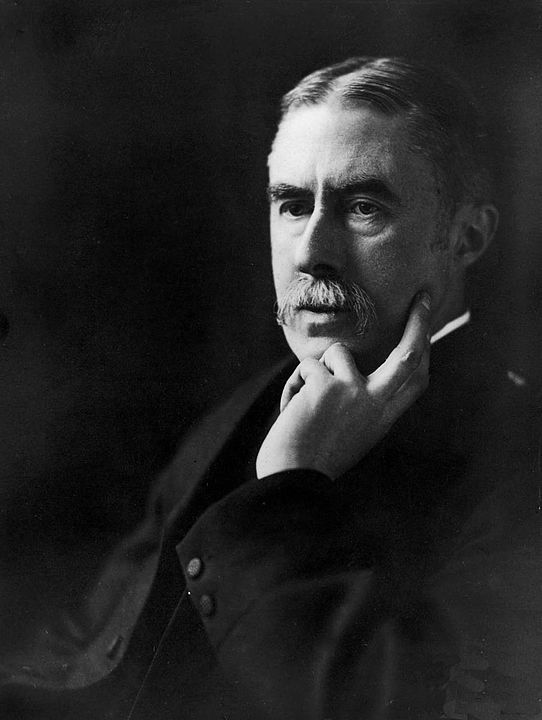
Two Men by the Sea (1817), a 51 cm x 66 cm oil on canvas by Caspar David Friedrich (1774-1880), located at the Alte Nationalgalerie in Berlin

Although Alfred Edward Housman remains well represented in anthologies 80 years after his death, it is not likely that either the critic or the lay reader would represent him as a major poet. Here it is wise to keep in mind T.S. Eliot’s observation that a poet, even if he is past master of his technique and a craftsman of unfailing dexterity, may yet occupy no prominent place in the literary firmament for any number of reasons. In Housman’s case, the reason is twofold: he produced, in a life of normal length, only enough verse to fill a pair of small volumes supplemented after his death by a third which his brother Laurence cobbled together from his leftover notebooks. Additionally, the verse he wrote, though for quality it is one of the most even bodies of composition in the English language, is as slender in its themes as it is slight in its volume.
No poet, probably, wishes that his work might be reducible to a few morals or maxims, but very possibly Housman’s collected lamentations could so be epitomized. Housman was a singular creature, a noble-minded nihilist of intense feeling whose instinct to argue against the fixed deck of Dame Fortune was always overborne by the discipline of stoic reserve. The tension is always strong, but in the end, Housman the Roman philosopher wrestles Housman the village atheist into a tortured submission:
The troubles of our proud and angry dust
Are from eternity, and shall not fail.
Bear them we can, and if we can we must.
Shoulder the sky, my lad, and drink your ale.
It was no accident that Housman was a classicist by profession. The moral of his poetry is the moral of half of the Horatian odes and the whole of Lucretius: cultivate an even temper, savor what grapes life offers you, and do not love any part of the present so well that you cannot bear to lose it, for lose it you must. Ne quaesieris, or in Housmanese:
If the heats of hate and lust
In the house of flesh be strong,
Let me mind the house of dust,
Where my sojourn shall be long.
Housman developed, in his poems, a habit of checking his own emotions and resentments out loud, with the result of emphasizing the very thing suppressed, as if his inner stoic were a man in a crowded theater hissing “Quiet there!” at a coughing man in tones louder than the cough.
Stay, if you list, O passer by the way;
Yet night approaches; better not to stay.
I never sigh, nor flush, nor knit the brow,
Nor grieve to think how ill God made me, now.
Here, with one balm for many fevers found,
Whole of an ancient evil, I sleep sound.
The effect here lies somewhere between a Promethean outburst and the posturing resignation of Senecan tragedy. Housman was not a dry man, and he cast less peaceful and somber a shadow on the page than he probably thought. Something like Walter Savage Landor’s “I strove with none, for none was worth my strife” does not really get at the heart of the man, for in truth, Housman was professionally combative and none to suffer fools gladly. The same, ironically, could be said for the Romanesque Landor himself, whose notoriously acrimonious nature gives the lie to “The Dying Speech of the Old Philosopher.” The printed thoughts of Housman the textual critic on the best efforts of his colleagues in that dryest of departments stupefy even the most inveterate cynic with their sheer rudeness:
Nature, not content with denying to Mr. — the faculty of thought, has endowed him with the faculty of writing.
Stoeber’s mind, though that is no name to call it by, was one which turned as unswervingly to the false, the meaningless, the unmetrical, and the ungrammatical, as the needle to the pole.
These are not the sentiments of a man who, in his private considerations, is content to shrug complacently at the dismal signs and portents of the world and pour himself another glass of Falernian. Neither was the choleric professor invisible in the poet. “A Shropshire Lad” and “Last Poems” are props beneath that old dictum of Matthew Arnold’s, that poetry is a criticism of life.
Housman’s brief lyrics have in them always a spirit of remonstration barely restrained. He never allowed himself to ventilate rebukes or lash out in vain petulance, for he was a fairly consistent atheist, whose confidence in a deaf, dumb, blind and cold universe was not of a kind to be shaken by passing moods and fancies. It was enough for him to capture, time and again, a picture of those dire incongruities of man’s everlasting condition which compose the great riddle of unbelief. He allowed himself his curt reviews and his teeth-grinding, and kept his peace: “Let us endure an hour and see injustice done.”
Only on the rarest occasion do any of his poems flutter into that fin de siecle emotionalism which mars so much of the work of Dowson, Symons, and most of the fellowship of the Yellow Book. Compare the difference between Dowson’s
“They are not long, the weeping and the laughter,
Love and desire and hate:
I think they have no portion in us after
We pass the gate.
They are not long, the days of wine and roses:
Out of a misty dream
Our path emerges for a while, then closes
Within a dream.
and Housman’s
When earth’s foundations flee,
Nor sky nor land nor sea At all is found,
Content you, let them burn:
It is not your concern; Sleep on, sleep sound.
and you have the difference between a bleary-eyed and a clear-eyed Epicureanism. Housman was never a decadent, and ofttimes sounds as earnest as Charles Kingsley. His commemoration of Queen Victoria’s golden jubilee, which ends with the soberly patriotic “Get you the sons your fathers got,/And God will save the queen” is probably the best thing in his first collection, and all the more praiseworthy for lacking the gong-thumping jingoism that spoils nearly every poem of the kind. Try to enjoy Thomson’s “Rule Britannia” without the music and see if you do not find yourself laughing at the end of the first stanza and embarrassed at the close of the second.
As a Tory of the old free-trade-hating school, Housman was able to distinguish between the British nation and the British empire, and showed himself capable of respecting the one without reference to the other. No discriminating critic would deny the greatness of many of Kipling’s “Barrack-Room Ballads,” but it must be owned that certain of these are not so much poetry as energized fustian that the Muses condescended to bless as an afterthought. Whether one reads him aloud or quietly, he is best appreciated with a pair of ear-plugs.
As with Kipling, soldiers figure frequently in Housman’s work, but it is not with the “shop” of military life that he concerned himself. Theirs is an elemental trade, and it was in elemental things that Housman labored. Creation was for him pulvis et umbrae and no more, in spite of any appearance to the contrary. The vision addresses itself to the reader in nearly everything he wrote, and never is it mitigated by even an occasional coloring of optimism. The narrator of quite a number of the Shropshire poems tenders the eternal consolation of the glum, that at least our lot now is no worse than anyone’s ever was, and the present is no blacker than the past or future. The Valley of the Shadow of Death has no sunny uplands at either end of it, so let us study perseverance at the expense of hope. Of all mature attitudes, this is one of the least enviable. So, concluding, he was not one for causes. An intensely private man, he is a monument to a time, long since lost to us, when not every man or woman of letters felt the urge to pester the editor about the evils of processed food or Big Tobacco.
Providence was kind to Housman when it ended his life in 1936. Greater and more numerous difficulties would have beset him, I think, in forbearing with the assorted flagrancies and sheer vulgarity of politics dominated by dictators and popular culture dominated by the young. It is depressing to imagine the self-possessed, sardonic Housman reduced to the status of a bitter Methuselah. If a man is determined to believe that the world can grow no better it is a cruelty to force him to wait and watch as it grows slightly worse. Housman, after bequeathing to posterity a few poems of exquisite perfectionism, was spared that fate. I hope that he is resting well:
We now to peace and darkness
And earth and thee restore
Thy creature that thou madest
And wilt cast forth no more.